- Home
- William Gibson
Count Zero Page 2
Count Zero Read online
Page 2
Conroy settled himself on a low, rectangular cushion of slate-gray ultrasuede. Turner stood, his hands slack at his sides. Conroy took a knurled silver inhaler from the low enamel table between them. “Choline enhancer?”
“No.”
Conroy jammed the inhaler into one nostril and snorted. “You want some sushi?” He put the inhaler back on the table. “We caught a couple of red snapper about an hour ago.”
Turner stood where he was, staring at Conroy.
“Christopher Mitchell,” Conroy said. “Maas Biolabs. Their head hybridoma man. He’s coming over to Hosaka.”
“Never heard of him.”
“Bullshit. How about a drink?”
Turner shook his head.
“Silicon’s on the way out, Turner. Mitchell’s the man who made biochips work, and Maas is sitting on the major patents. You know that. He’s the man for monoclonals. He wants out. You and me, Turner, we’re going to shift him.”
“I think I’m retired, Conroy. I was having a good time, back there.”
“That’s what the psych team in Tokyo say. I mean, it’s not exactly your first time out of the box, is it? She’s a field psychologist, on retainer to Hosaka.”
A muscle in Turner’s thigh began to jump.
“They say you’re ready, Turner. They were a little worried, after New Delhi, so they wanted to check it out. Little therapy on the side. Never hurts, does it?”
2
MARLY
SHE’D WORN HER BEST for the interview, but it was raining in Brussels and she had no money for a cab. She walked from the Eurotrans station.
Her hand, in the pocket of her good jacket—a Sally Stanley but almost a year old—was a white knot around the crumpled telefax. She no longer needed it, having memorized the address, but it seemed she could no more release it than break the trance that held her here now, staring into the window of an expensive shop that sold menswear, her focus phasing between sedate flannel dress shirts and the reflection of her own dark eyes.
Surely the eyes alone would be enough to cost her the job. No need for the wet hair she now wished she’d let Andrea cut. The eyes displayed a pain and an inertia that anyone could read, and most certainly these things would soon be revealed to Herr Josef Virek, least likely of potential employers.
When the telefax had been delivered, she’d insisted on regarding it as some cruel prank, another nuisance call. She’d had enough of those, thanks to the media, so many that Andrea had ordered a special program for the apartment’s phone, one that filtered out incoming calls from any number that wasn’t listed in her permanent directory. But that, Andrea had insisted, must have been the reason for the telefax. How else could anyone reach her?
But Marly had shaken her head and huddled deeper into Andrea’s old terry robe. Why would Virek, enormously wealthy, collector and patron, wish to hire the disgraced former operator of a tiny Paris gallery?
Then it had been Andrea’s time for head-shaking, in her impatience with the new, the disgraced Marly Krushkhova, who spent entire days in the apartment now, who sometimes didn’t bother to dress. The attempted sale, in Paris, of a single forgery, was hardly the novelty Marly imagined it to have been, she said. If the press hadn’t been quite so anxious to show up the disgusting Gnass for the fool he most assuredly was, she continued, the business would hardly have been news. Gnass was wealthy enough, gross enough, to make for a weekend’s scandal. Andrea smiled. “If you had been less attractive, you would have gotten far less attention.”
Marly shook her head.
“And the forgery was Alain’s. You were innocent. Have you forgotten that?”
Marly went into the bathroom, still huddled in the threadbare robe, without answering.
Beneath her friend’s wish to comfort, to help, Marly could already sense the impatience of someone forced to share a very small space with an unhappy, nonpaying guest.
And Andrea had had to loan her the fare for the Eurotrans.
With a conscious, painful effort of will, she broke from the circle of her thoughts and merged with the dense but sedate flow of serious Belgian shoppers.
A girl in bright tights and a boyfriend’s oversized loden jacket brushed past, scrubbed and smiling. At the next intersection, Marly noticed an outlet for a fashion line she’d favored in her own student days. The clothes looked impossibly young.
In her white and secret fist, the telefax.
Galerie Duperey, 14 Rue au Beurre, Bruxelles.
Josef Virek.
The receptionist in the cool gray anteroom of the Galerie Duperey might well have grown there, a lovely and likely poisonous plant, rooted behind a slab of polished marble inlaid with an enameled keyboard. She raised lustrous eyes as Marly approached. Marly imagined the click and whirr of shutters, her bedraggled image whisked away to some far corner of Josef Virek’s empire.
“Marly Krushkhova,” she said, fighting the urge to produce the compacted wad of telefax, smooth it pathetically on the cool and flawless marble. “For Herr Virek.”
“Fraulein Krushkhova,” the receptionist said, “Herr Virek is unable to be in Brussels today.”
Marly stared at the perfect lips, simultaneously aware of the pain the words caused her and the sharp pleasure she was learning to take in disappointment. “I see.”
“However, he has chosen to conduct the interview via a sensory link. If you will please enter the third door on your left . . .”
The room was bare and white. On two walls hung unframed sheets of what looked like rain-stained cardboard, stabbed through repeatedly with a variety of instruments. Katatonenkunst. Conservative. The sort of work one sold to committees sent round by the boards of Dutch commercial banks.
She sat down on a low bench covered in leather and finally allowed herself to release the telefax. She was alone, but assumed that she was being observed somehow.
“Fraulein Krushkhova.” A young man in a technician’s dark green smock stood in the doorway opposite the one through which she’d entered. “In a moment, please, you will cross the room and step through this door. Please grasp the knob slowly, firmly, and in a manner that affords maximum contact with the flesh of your palm. Step through carefully. There should be a minimum of spatial disorientation.”
She blinked at him. “I beg—”
“The sensory link,” he said, and withdrew, the door closing behind him.
She rose, tried to tug some shape into the damp lapels of her jacket, touched her hair, thought better of it, took a deep breath, and crossed to the door. The receptionist’s phrase had prepared her for the only kind of link she knew, a simstim signal routed via Bell Europa. She’d assumed she’d wear a helmet studded with dermatrodes, that Virek would use a passive viewer as a human camera.
But Virek’s wealth was on another scale of magnitude entirely.
As her fingers closed around the cool brass knob, it seemed to squirm, sliding along a touch spectrum of texture and temperature in the first second of contact.
Then it became metal again, green-painted iron, sweeping out and down, along a line of perspective, an old railing she grasped now in wonder.
A few drops of rain blew into her face.
Smell of rain and wet earth.
A confusion of small details, her own memory of a drunken art school picnic warring with the perfection of Virek’s illusion.
Below her lay the unmistakable panorama of Barcelona, smoke hazing the strange spires of the Church of the Sagrada Familia. She caught the railing with her other hand as well, fighting vertigo. She knew this place. She was in the Güell Park, Antonio Gaudí’s tatty fairyland, on its barren rise behind the center of the city. To her left, a giant lizard of crazy-quilt ceramic was frozen in midslide down a ramp of rough stone. Its fountain-grin watered a bed of tired flowers.
“You are disoriented. Please forgive me.”
Josef Virek was perched below her on one of the park’s serpentine benches, his wide shoulders hunched in a soft topcoat. His featur
es had been vaguely familiar to her all her life. Now she remembered, for some reason, a photograph of Virek and the king of England. He smiled at her. His head was large and beautifully shaped beneath a brush of stiff dark gray hair. His nostrils were permanently flared, as though he sniffed invisible winds of art and commerce. His eyes, very large behind the round, rimless glasses that were a trademark, were pale blue and strangely soft.
“Please.” He patted the bench’s random mosaic of shattered pottery with a narrow hand. “You must forgive my reliance on technology. I have been confined for over a decade to a vat. In some hideous industrial suburb of Stockholm. Or perhaps of hell. I am not a well man, Marly. Sit beside me.”
Taking a deep breath, she descended the stone steps and crossed the cobbles. “Herr Virek,” she said, “I saw you lecture in Munich, two years ago. A critique of Faessler and his autistiches Theater. You seemed well then . . .”
“Faessler?” Virek’s tanned forehead wrinkled. “You saw a double. A hologram perhaps. Many things, Marly, are perpetrated in my name. Aspects of my wealth have become autonomous, by degrees; at times they even war with one another. Rebellion in the fiscal extremities. However, for reasons so complex as to be entirely occult, the fact of my illness has never been made public.”
She took her place beside him and peered down at the dirty pavement between the scuffed toes of her black Paris boots. She saw a chip of pale gravel, a rusted paper clip, the small dusty corpse of a bee or hornet. “It’s amazingly detailed . . .”
“Yes,” he said, “the new Maas biochips. You should know,” he continued, “that what I know of your private life is very nearly as detailed. More than you yourself do, in some instances.”
“You do?” It was easiest, she found, to focus on the city, picking out landmarks remembered from a half-dozen student holidays. There, just there, would be the Ramblas, parrots and flowers, the taverns serving dark beer and squid.
“Yes. I know that it was your lover who convinced you that you had found a lost Cornell original . . .”
Marly shut her eyes.
“He commissioned the forgery, hiring two talented student-artisans and an established historian who found himself in certain personal difficulties . . . He paid them with money he’d already extracted from your gallery, as you have no doubt guessed. You are crying . . .”
Marly nodded. A cool forefinger tapped her wrist.
“I bought Gnass. I bought the police off the case. The press weren’t worth buying; they rarely are. And now, perhaps, your slight notoriety may work to your advantage.”
“Herr Virek, I—”
“A moment, please. Paco! Come here, child.”
Marly opened her eyes and saw a child of perhaps six years, tightly gotten up in dark suit coat and knickers, pale stockings, high-buttoned black patent boots. Brown hair fell across his forehead in a smooth wing. He held something in his hands, a box of some kind.
“Gaudí began the park in 1900,” Virek said. “Paco wears the period costume. Come here, child. Show us your marvel.”
“Señor,” Paco lisped, bowing, and stepped forward to exhibit the thing he held.
Marly stared. Box of plain wood, glass-fronted. Objects . . .
“Cornell,” she said, her tears forgotten. “Cornell?” She turned to Virek.
“Of course not. The object set into that length of bone is a Braun biomonitor. This is the work of a living artist.”
“There are more? More boxes?”
“I have found seven. Over a period of three years. The Virek Collection, you see, is a sort of black hole. The unnatural density of my wealth drags irresistibly at the rarest works of the human spirit. An autonomous process, and one I ordinarily take little interest in. . . .”
But Marly was lost in the box, in its evocation of impossible distances, of loss and yearning. It was somber, gentle, and somehow childlike. It contained seven objects.
The slender fluted bone, surely formed for flight, surely from the wing of some large bird. Three archaic circuit boards, faced with mazes of gold. A smooth white sphere of baked clay. An age-blackened fragment of lace. A finger-length segment of what she assumed was bone from a human wrist, grayish white, inset smoothly with the silicon shaft of a small instrument that must once have ridden flush with the surface of the skin—but the thing’s face was seared and blackened.
The box was a universe, a poem, frozen on the boundaries of human experience.
“Gracias, Paco.”
Box and boy were gone.
She gaped.
“Ah. Forgive me, I have forgotten that these transitions are too abrupt for you. Now, however, we must discuss your assignment . . .”
“Herr Virek,” she said, “what is ‘Paco’?”
“A subprogram.”
“I see.”
“I have hired you to find the maker of the box.”
“But, Herr Virek, with your resources—”
“Of which you are now one, child. Do you not wish to be employed? When the business of Gnass having been stung with a forged Cornell came to my attention, I saw that you might be of use in this matter.” He shrugged. “Credit me with a certain talent for obtaining desired results.”
“Certainly, Herr Virek! And, yes, I do wish to work!”
“Very well. You will be paid a salary. You will be given access to certain lines of credit, although, should you need to purchase, let us say, substantial amounts of real estate—”
“Real estate?”
“Or a corporation, or spacecraft. In that event, you will require my indirect authorization. Which you will almost certainly be given. Otherwise, you will have a free hand. I suggest, however, that you work on a scale with which you yourself are comfortable. Otherwise, you run the risk of losing touch with your intuition, and intuition, in a case such as this, is of crucial importance.” The famous smile glittered for her once more.
She took a deep breath. “Herr Virek, what if I fail? How long do I have to locate this artist?”
“The rest of your life,” he said.
“Forgive me,” she found herself saying, to her horror, “but I understood you to say that you live in a—a vat?”
“Yes, Marly. And from that rather terminal perspective, I should advise you to strive to live hourly in your own flesh. Not in the past, if you understand me. I speak as one who can no longer tolerate that simple state, the cells of my body having opted for the quixotic pursuit of individual careers. I imagine that a more fortunate man, or a poorer one, would have been allowed to die at last, or be coded at the core of some bit of hardware. But I seem constrained, by a byzantine net of circumstance that requires, I understand, something like a tenth of my annual income. Making me, I suppose, the world’s most expensive invalid. I was touched, Marly, at your affairs of the heart. I envy you the ordered flesh from which they unfold.”
And, for an instant, she stared directly into those soft blue eyes and knew, with an instinctive mammalian certainty, that the exceedingly rich were no longer even remotely human.
A wing of night swept Barcelona’s sky, like the twitch of a vast slow shutter, and Virek and Güell were gone, and she found herself seated again on the low leather bench, staring at torn sheets of stained cardboard.
3
BOBBY PULLS A WILSON
IT WAS SUCH an easy thing, death. He saw that now: It just happened. You screwed up by a fraction and there it was, something chill and odorless, ballooning out from the four stupid corners of the room, your mother’s Barrytown living room.
Shit, he thought, Two-a-Day’ll laugh his ass off, first time out and I pull a wilson.
The only sound in the room was the faint steady burr of his teeth vibrating, supersonic palsy as the feedback ate into his nervous system. He watched his frozen hand as it trembled delicately, centimeters from the red plastic stud that could break the connection that was killing him.
Shit.
He’d come home and gotten right down to it, slotted the icebreaker h
e’d rented from Two-a-Day and jacked in, punching for the base he’d chosen as his first live target. Figured that was the way to do it; you wanna do it, then do it. He’d only had the little Ono-Sendai deck for a month, but he already knew he wanted to be more than just some Barrytown hotdogger. Bobby Newmark, aka Count Zero, but it was already over. Shows never ended this way, not right at the beginning. In a show, the cowboy hero’s girl or maybe his partner would run in, slap the trodes off, hit that little red OFF stud. So you’d make it, make it through.
But Bobby was alone now, his autonomic nervous system overridden by the defenses of a database three thousand kilometers from Barrytown, and he knew it. There was some magic chemistry in that impending darkness, something that let him glimpse the infinite desirability of that room, with its carpet-colored carpet and curtain-colored curtains, its dingy foam sofa-suite, the angular chrome frame supporting the components of a six-year-old Hitachi entertainment module.
He’d carefully closed those curtains in preparation for his run, but now, somehow, he seemed to see out anyway, where the condos of Barrytown crested back in their concrete wave to break against the darker towers of the Projects. That condo wave bristled with a fine insect fur of antennas and chicken-wired dishes, strung with lines of drying clothes. His mother liked to bitch about that; she had a dryer. He remembered her knuckles white on the imitation bronze of the balcony railing, dry wrinkles where her wrist was bent. He remembered a dead boy carried out of Big Playground on an alloy stretcher, bundled in plastic the same color as a cop car. Fell and hit his head. Fell. Head. Wilson.
His heart stopped. It seemed to him that it fell sideways, kicked like an animal in a cartoon.
Sixteenth second of Bobby Newmark’s death. His hotdogger’s death.
And something leaned in, vastness unutterable, from beyond the most distant edge of anything he’d ever known or imagined, and touched him.
::: WHAT ARE YOU DOING? WHY ARE THEY DOING THAT TO YOU?

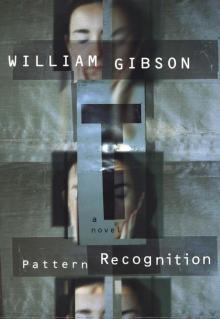 Pattern Recognition
Pattern Recognition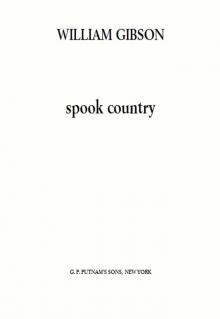 Spook Country
Spook Country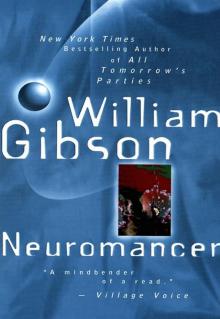 Neuromancer
Neuromancer Skinner's Room
Skinner's Room The Difference Engine
The Difference Engine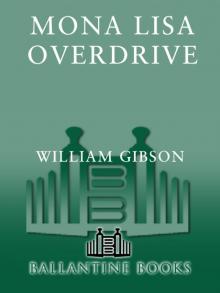 Mona Lisa Overdrive
Mona Lisa Overdrive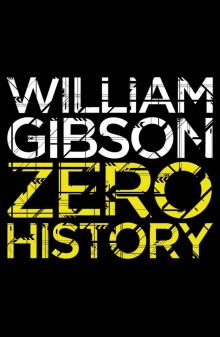 Zero History
Zero History The Peripheral
The Peripheral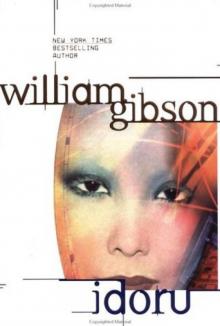 Idoru
Idoru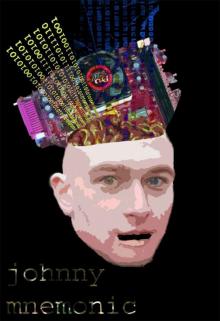 Johnny Mnemonic
Johnny Mnemonic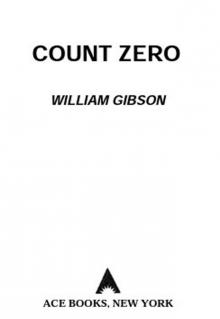 Count Zero
Count Zero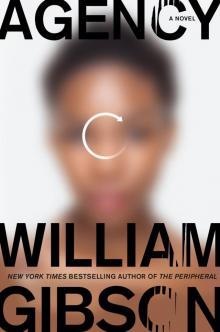 Agency
Agency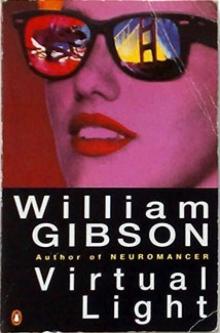 Virtual Light
Virtual Light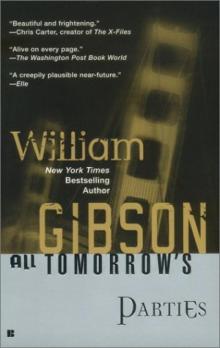 All Tomorrow's Parties
All Tomorrow's Parties The Miracle Worker
The Miracle Worker Disneyland with the Death Penalty
Disneyland with the Death Penalty Idoru tb-2
Idoru tb-2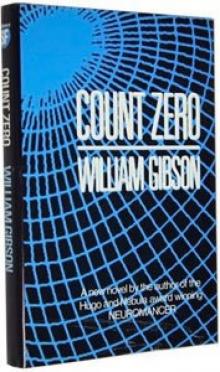 Count Zero s-2
Count Zero s-2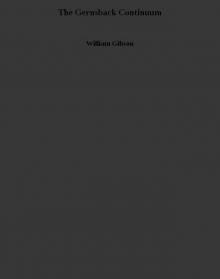 The Gernsback Continuum
The Gernsback Continuum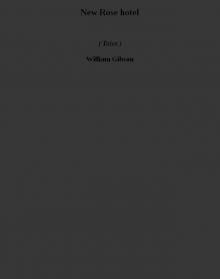 New Rose hotel (tales)
New Rose hotel (tales)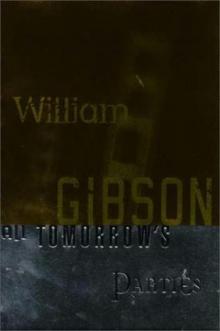 All Tomorrow's Parties bt-3
All Tomorrow's Parties bt-3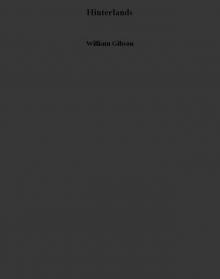 Hinterlands
Hinterlands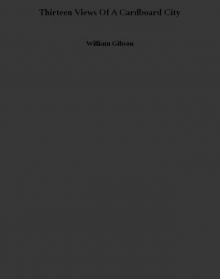 Thirteen Views Of A Cardboard City
Thirteen Views Of A Cardboard City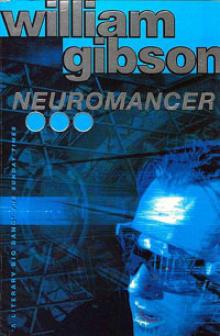 Neuromancer ts-1
Neuromancer ts-1 Virtual light b-1
Virtual light b-1